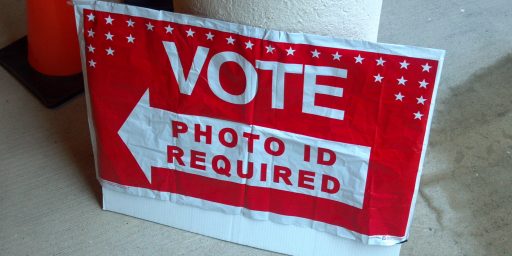Letting Voting Rights Act Emergency Provisions Die
Abigail Thernstrom and Edward Blum argue in today’s OpinionJournal that we should not re-extend the so-called “emergency” provisions of the 1965 Voting Rights Act when they expire in two years.
Do the Right Thing – It’s time to let the “emergency” provisions of the Voting Rights Act die.
[…] Section 5 is the most important of the provisions due to expire in 2007. It forces “covered” states and counties to “preclear” every voting-related change they make with the U.S. attorney general or the D.C. district court. Thus, before a covered jurisdiction moves a polling place two blocks or redraws congressional districting lines, it must obtain federal approval. Most of the states and counties on the federal watch list are in the South. But today, for instance, Manhattan, the Bronx and Brooklyn are covered, but Queens and Staten Island are not. Arizona is covered, but not New Mexico. In 1965 every part of the act made perfect sense. No longer.
[…]
Preclearance is no longer defensible. Another provision, known as section 2, takes a more reasonable approach to the same problems preclearance was designed to address. This provision allows plaintiffs to initiate suits in any jurisdiction across the nation if they believe minority voters have “less opportunity than other members of the electorate to participate in the political process and to elect representatives of their choice.” But the burden of proof is on the plaintiffs and jurisdictions have an opportunity to defend themselves in a local court. Career Justice Department attorneys partial to plaintiffs will not be resolving disputes behind closed doors.
Will the GOP truly benefit politically from its craven surrender to Jesse Jackson and other activists eager to wave the racism flag? Not a chance. In fact, the opportunities for mischief using the Voting Rights Act are only growing. A 2003 Supreme Court decision encourages the Justice Department to think of both white and minority Democrats as “responsive” to black and Hispanic interests. In coming years, the statute is thus likely to become a handy tool to push partisan as well as racial redistricting.
Opposing the civil-rights lobby requires political courage–a commodity rarely seen in Washington. Many Republicans in Congress understand the principles involved here, but aren’t willing to fight for them. Draconian federal intrusion into local elections was justified when it was the only way to enfranchise Southern blacks–but 40 years on, it’s an unconstitutional travesty.
Agreed. The preclearance requirement gives an unelected federal bureaucracy power over something the Constitution specifically reserves to the several States, for reasons long since moot.
Rick Hasen answers the other obvious question–Why is this column coming out two years before the expiration?–with a simple explanation: Because President Bush and the Republican leadership in Congress are pushing hard to get the renewal done. He also notes that the Supreme Court has allowed this provision to stand for years, but that the issue has not come up during the “New Federalism” revolution on the Court–let alone in a post-O’Connor Court.






Simple politics says that if the GOP begins a movement to allow these provisions to expire, the Democrats will cry out that the GOP wants to supress the black vote.
Unfair, certainly. But it is a reality especially considering how most Democrats think Republicans denied blacks their vote in FL in 2000 and OH in 2004.
The politicians will not let slip away a chance to intensify racial and ethnic conflict, when their hopes of power are ridng on just that.